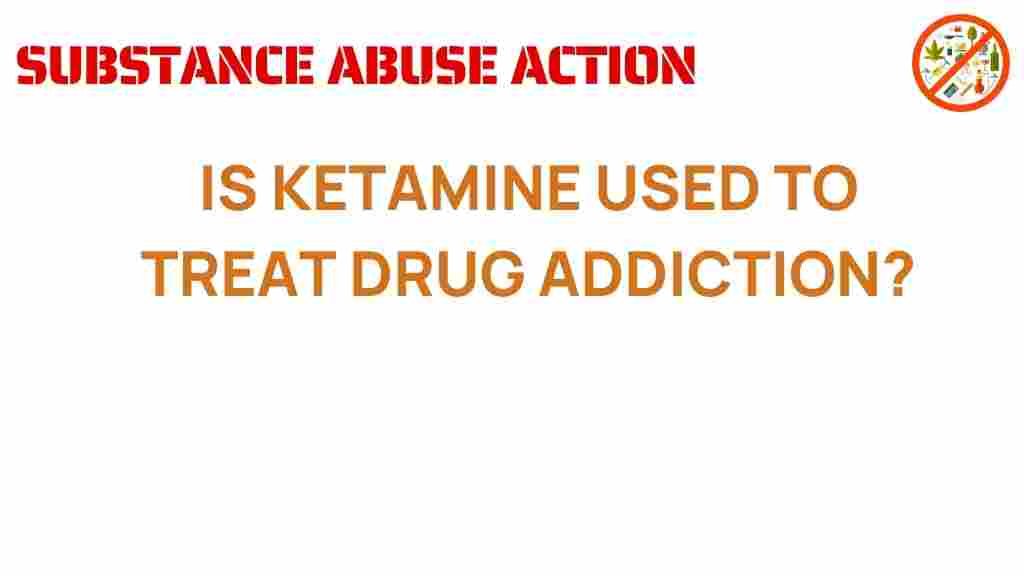Unlocking the Mystery: Is Ketamine a Viable Treatment for Drug Addiction?
In recent years, the conversation around mental health and innovative approaches to treatment has evolved significantly. One substance that has gained attention in this context is ketamine. Originally developed as an anesthetic, ketamine is now being explored for its potential in treating various forms of drug addiction and mental health disorders such as depression. But how viable is ketamine as a treatment option for those struggling with substance use? This article delves deeper into the relationship between ketamine, addiction therapy, and the journey towards recovery.
Understanding Drug Addiction and Its Challenges
Drug addiction is a complex condition characterized by compulsive drug-seeking behavior and use despite harmful consequences. The cycle of addiction often leads to a range of mental health issues, including anxiety and depression. Traditional treatment methods can be effective, but they do not work for everyone. This has prompted researchers and clinicians to explore innovative approaches to addiction treatment, including the use of ketamine.
What is Ketamine?
Ketamine is a dissociative anesthetic that has been used in medical settings since the 1960s. It works by blocking the NMDA receptor in the brain, which is involved in pain perception, memory, and mood regulation. Recent studies have shown that ketamine can produce rapid antidepressant effects, making it a focal point in the treatment of mental health issues and, more recently, drug addiction.
How Ketamine Works in Treating Drug Addiction
The potential of ketamine in treating drug addiction lies in its ability to create new neural pathways in the brain. This is particularly important for individuals recovering from addiction, as their brains may be wired to seek out substances. Here’s a closer look at how ketamine might help:
- Reduction of Cravings: Ketamine has been shown to lower cravings for certain substances, making it easier for individuals to resist the urge to use.
- Improved Mood: By alleviating symptoms of depression, ketamine can enhance overall mood and emotional stability, which are crucial during recovery.
- Neuroplasticity: Ketamine promotes neuroplasticity, allowing individuals to form new, healthy habits and thought patterns.
Step-by-Step Process of Ketamine Treatment for Addiction
Undergoing ketamine treatment for drug addiction typically involves several steps:
- Initial Assessment: A healthcare provider conducts a thorough assessment of the individual’s addiction history, mental health status, and overall health.
- Creating a Treatment Plan: Based on the assessment, a personalized treatment plan is developed, which may include ketamine therapy along with other therapeutic modalities.
- Administration of Ketamine: Ketamine can be administered intravenously, intranasally, or via intramuscular injection in a controlled clinical setting.
- Monitoring and Support: Patients are monitored closely during and after treatment sessions to ensure safety and effectiveness. Supportive therapy may also be integrated.
- Follow-up Care: Ongoing follow-up is essential to assess progress and make necessary adjustments to the treatment plan.
Therapeutic Integration with Ketamine Treatment
While ketamine can be an effective tool in treating drug addiction, it is not a standalone solution. Integrating therapy is crucial for long-term recovery. Here are some therapeutic approaches that work well when combined with ketamine:
- Cognitive Behavioral Therapy (CBT): This therapy helps individuals identify and change negative thought patterns related to their addiction.
- Motivational Interviewing: A counseling approach that enhances an individual’s motivation to change by resolving ambivalence.
- Support Groups: Engaging with others who are on similar recovery journeys can provide encouragement and accountability.
Troubleshooting Common Concerns
As with any treatment, there are concerns and misconceptions about ketamine therapy for drug addiction. Here are some common issues and tips for addressing them:
- Concerns About Safety: Ketamine is considered safe when administered by trained professionals. Always ensure you are receiving treatment in a reputable clinic.
- Potential for Abuse: While ketamine has a history of misuse, its use in a controlled therapeutic setting is significantly different from recreational use.
- Lack of Awareness: Many people are unaware of the benefits of ketamine therapy. Educating yourself and others about its potential can help demystify the treatment.
Conclusion: The Future of Ketamine in Addiction Treatment
As we continue to explore the complexities of drug addiction, ketamine emerges as a promising option for those seeking recovery. Its ability to alleviate symptoms of depression, reduce cravings, and promote neuroplasticity offers hope for many who have struggled with substance use. While ketamine should be part of a comprehensive treatment plan, its role in the landscape of addiction therapy cannot be overlooked.
For those considering ketamine as a part of their recovery journey, it is essential to consult with healthcare professionals who specialize in addiction and mental health. Together, you can create a personalized treatment plan that incorporates innovative approaches while addressing individual needs.
For more information on innovative treatments for mental health, check out this external link.
Additionally, if you’re interested in learning more about drug addiction recovery resources, visit our internal link for comprehensive support options.
This article is in the category Treatment and created by SubstanceAbuseAction Team

5 thoughts on “Unlocking the Mystery: Is Ketamine a Viable Treatment for Drug Addiction?”